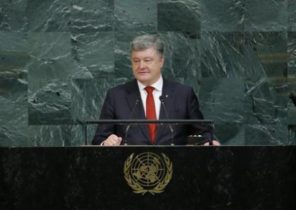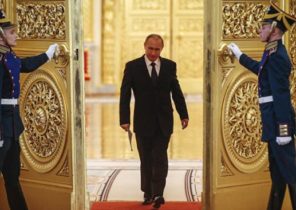
Donald trump wants to partner with Russia in Syria. One of his most frequent ideas in foreign policy, as during the election campaign and now is that the US and Russia in a natural way are allies in the fight against terrorism and the obvious place to start such cooperation should be Syria and fight against ISIS (banned in Russia as a terrorist organization). The US and Russia are waging a war against the Islamic state, thinks trump, so the best way to speed up the victory over this organization and, perhaps, to begin a broader rapprochement between the USA and Russia to unite with Russia in the fight against the Islamic state to conduct more coordinated military operations against terrorist organizations. In a recent interview on Fox trump held a controversial moral Parallels between the United States and Russia, Vladimir Putin, saying that “…Russia is better to get along than not get along, and if Russia will help us in the fight against ISIS-and that is our main fight is with Islamic terrorism around the world, it will be very good.”
Trump’s thoughts on this account are not something new. In the last four weeks were periodically distributed hints that such cooperation can be part of a larger “Grand bargain” between the US and Russia in which Russia will agree to fully cooperate in counter-terrorism operations and operations against ISIS, and that Washington will lift the sanctions related to the Russian aggression in Ukraine. Sunday 5 February, Vice-President Mike Pence (Mike Pence) have suggested that the administration’s decision to trump sanctions will depend on “whether we will see any changes in Russia’s position and the possibility to cooperate based on common interests,” including the fight against the Islamic state.
This idea is consistent with the General objectives of the global strategy trump, which we described in a previous article. The idea is that the conflict with “radical Islamic terrorism” is an existential and all-consuming; the desire to enter into business agreement with any participant with whom the US has at least a minimum of common interests, the desire to force other countries to take on more tasks in the world that the United States could throw off some of the burden of a superpower, all these goals are pursued, when trump defends cooperation with Putin on terrorism. But the offer to jump into bed with Russia in Syria improvident and dangerous, and the lifting of sanctions related to Russia’s actions in Ukraine, in exchange for this cooperation is even more a bad idea for a number of reasons.
Unlike what is often claimed the tramp, Russia’s military campaign in Syria (campaign trump, in fact, wants to combine military efforts of the U.S. to combat Islamic state) never had anything to do with fighting terrorism. Its overall goal, which was quite successfully achieved — to strengthen the power of Assad’s regime, protecting thus the strategic position of Russia in Syria, and — increasingly — in the middle East. This means that the goal of the vast majority of Russian air strikes and other operations was not a group of extremists, the Islamic state or al-Nusra front (Syrian branch of al Qaeda, which is now called jabhat al Fatah al-sham). Rather, we can say that Moscow waged the aggressive war against extremistas opposition to Assad (and the civilian population in areas occupied by the opposition), in an attempt to destroy any politically convincing and acceptable in international relations alternative to the existing regime. From the beginning of the Russian intervention in September 2015 for 85-90% of Russian air strikes were inflicted on the moderate opposition. Yes, Russia is waging war in Syria, but it is certainly not our war.
An accomplice in the crime
Cooperation with Russia will also mean the Alliance with Assad, the younger partner of Russia in this conflict, so we will become a partner of the regime responsible for the largest humanitarian disaster of the 21st century. Only this week Amnesty International reported that the military prison Sayedna 2011 was hanged 13 thousand people, in addition to countless others who have died from torture or inhuman conditions of detention. It is probably don’t care about trump, he argued (for the most part, wrongly) that “Assad is destroying ISIS”, explaining that, in his view, the U.S. must maintain a tough game, perhaps even enough to commit war crimes in the fight against jihadist terrorist groups. But the risks of an open or covert Alliance with Assad extend far beyond the concern associated with humanitarian issues.
If the United States will act jointly with the forces killing countless Syrians, mostly Sunnis, in the context of the civil war in Syria, in the long run it will only contribute to further spread of extremism directed against America. Next time, when Russia and Assad will destroy the new Aleppo (e.g. in Idlib), causing him strikes, and bringing the starving civilian population to the necessity of surrender, the United States will become their accomplice and will receive the whole barrage of ideological reaction, which entails this kind of cooperation. Moreover, the United States will also be guilty of actions that will exacerbate the unfolding immigration crisis, still continuing to politically destabilize Europe, than trump himself blamed the spread of Islamic radicalism on the continent.
This is not the only situation where a partnership with Russia and Assad would undermine, not reinforce, counter-terrorism policy of the United States. This option is likely to alienate those allies in the middle East who need the United States in the fight against the Islamic state. If trump wants to expand the campaign against ISIS, will it take him to Saudi Arabia, other Gulf monarchies and Turkey have increased their participation. But many of those countries hate Assad so much that for the past few years support the Syrian opposition. If the United States will join forces with Putin and Assad in Syria, America is in danger of breaking collaboration with these partners in the middle East. If cooperation between the US and Russia in Syria will lead to a further weakening of the non-extremist opposition (and most likely will), the Gulf countries and Turkey (already supporting a number of radical Islamist opposition groups) can also in response to this to be less selective in respect of those groups they support in Syria, thereby reinforcing not endangered extremist forces in this country.
This risk implies that the most likely to maintain the Alliance between the US and Russia are the same extremist group, against which this partnership should be directed. After all, if the continuing group of the moderate opposition will understand that the United States abandoned them, signed a deal with Moscow, they will have no incentive to resist the Union with the an-Nusra and other extremists, if this does not will depend on their life. In result, al-Nusra and other extremist groups, even deeper than it is now, mired in the web of the Syrian opposition, giving it more political and military means. Over extremist groups to easily gain the upper hand when they are isolated; a partnership with the city will have the opposite effect.
The Iranian riddle
Moreover, it will be extremely difficult to implement any kind of partnership with Russia in Syria, not in defiance of all one of the main priorities of the foreign policy trump the active opposition of Iran. Last week trump, and adviser on national security issues, Michael Flynn (as Michael Flynn) made Iran a “warning” that the United States will not tolerate their destabilizing actions throughout the Middle East, and rapidly announced new sanctions in connection with a new ballistic program of Iran. At the same time Iran is associated in Syria with Putin and Assad and strategically interested in preserving the Assad regime. Iran, therefore, is likely to win in any situation in which Washington will abandon the Syrian opposition, joining Moscow and its allies. In an attempt to cooperate with Russia on the issue of creation, for example, “safe zone” in the South of Syria will be in a position in which they will help Iran consolidate its supply routes of Hezbollah and its influence in the East, and the prospect of the administration of trump, not to mention Israel, presumably deems terrible.
Trump administration might try to mitigate this risk by putting in cooperation with Russia the conditions that the Assad regime will dissolve their ties with Iran and Hezbollah, and demanding that their forces withdraw from the country. (Administration trump may also try to get Moscow to stop its arms sales to Iran). Such a deal would, presumably, save support from the side of Saudi Arabia, Turkey and other countries in the region, as their hostility to Assad, mainly connected with his Alliance with Tehran. But there is a catch: given the broad and deep role of Iran, Hezbollah, and the Iranian-backed Shiite armed groups in helping Assad’s forces in Syria, Assad is unlikely to give up this partnership, and if he even tried to do this, Tehran would be stiff resistance. Previous modes truce declared behind Iran, were thwarted by forces receiving support from this state. Any attempt to completely expel Iran from Syria will be fundamentally contrary to the interests of Tehran in the preservation of influence in the East and the support of Hezbollah against Israel. Thus, if the team, trump will try to make a deal with Iran, it will have to face his well-armed supporters (like in Syria and Iraq) that will prevent the United States in the fight against the Islamic state and will create an incentive for receiving support from Iranian factions to strike at vulnerable U.S. forces on the territory of these countries. For all these reasons, the Alliance with the Russian forces would be a dangerous enterprise. The Obama administration understood these risks, considering a more narrow military cooperation with Russia in Syria in 2016. As it was reported everywhere at that time, internal divisions within the administration about whether to conduct even a minimal military cooperation, has become one of the most controversial topics of Obama’s second term. Thus, the Obama administration has always put very strict conditions in the matter of any possible cooperation with Russia in combating terrorism.
In summer and early autumn 2016, during negotiations over a potential “Joint center for delineation terrorists” for causing coordinated strikes on al-Nusra and the Islamic state, Obama insisted that Moscow imposed a ceasefire throughout the country (including besieged Aleppo), providing the precondition for unimpeded access for humanitarian transport UN on Syria. Obama also demanded that if the Joint center for separation to be created, Russia would have to comply with the laws, avoiding the strikes against moderate opposition, to ban flights of the air force of Assad almost all over the country, to impose on the U.S. veto to strike Russian counter-terrorism purposes and to insist on the resumption of negotiations with the Assad regime on the transfer of power. In the end the Russians are unable or unwilling to convince Assad (and Iran) to comply with these conditions, and the proposal failed.
This should serve as a clear warning to the Trump. If his administration will cooperate with Moscow, not making any demands, it will become an accomplice of Russia’s actions, fueling a civil war and Islamic terrorism. But if trump will try to impose serious conditions, Putin is unlikely to agree to a deal or barely give her attention.
If it is already active, so the decision to go for broke with Russia in Syria is counterproductive, the irony is that it is also optional. Trump also claims that the campaign against the Islamic state fails, and Russia can provide substantial assistance in the fight against terrorism. However, none of these statements is not true. Several times, when Russia really wanted to attack the Islamic state, she could not. In fact, one of the few areas where ISIS has conquered territory in the past year and a half, became a PAL, won in the clash with the forces of Russia and Syria. Russia also cannot provide any effective support in the campaign for the liberation of Raqqa, its power mostly focused on the suppression of the opposition and stabilizing the Assad regime in Western Syria, which is far from the actual capital of ISIS.
Most importantly, the campaign against the Islamic state is not a fiasco, it is moving steadily and is now at the peak of his success. The us and receiving support from the US operations significantly reduced the number of ISIS forces, territory, military capacity, financial resources and morale, especially after the campaign was expanded in the middle and the end of 2015. The Islamic state have not captured any significant areas of strength, supported by USA, with destruction of Ramadi in may 2015; it also lost control over the cities of Fallujah and Ramali in the West of Iraq to Manija and Jarabulus in Northern Syria. Continuing operations for the conquest of Mosul and Raqqa, the geographical locations of the so-called Caliphate and the last major towns under the control of the IG; approximately half of Mosul was conquered, and RACC surrounded by a coalition of Syrian Kurds and the United Arab forces, receiving support from the United States. Even if trump will do nothing to expand the campaign against Islamic state, these cities are likely to be released during the next few months.
Of course, there are still very serious questions that need to be considered in the context of these fights, including problems of management after the liberation of Mosul and the resolution of conflicts between Syrian Kurds and NATO ally Turkey, if we talk about raqqa. However, the deepening of cooperation with Moscow does not contribute to the solution of these long-term issues.
If you look beyond the ISIS threat, which very likely will increase in the next few years, present a potential external operations of al-Nusra. But this threat will only increase (and not weaken) if trump would enter into an Alliance with Russia, pushing an even greater number of opposition groups in the grip of al-Nusra. To cope with this threat, the U.S. would have been better to work with all parties, upholding a political entity, which reduces the willingness of opposition groups to cooperate with the an-Nusra, and expanding their unilateral operations against external members of this group.
Masterful theft
Finally, if the idea of cooperation with Russia in the fight against the Islamic state is not so bad, the prospect of the lifting of sanctions imposed on Russia in connection with its actions in Ukraine, much worse. Team trump may treat this transaction as a profitable exchange, in which the President refuses of something that is not too worried about it (from Ukraine), in favor of cooperation with Russia where it is most needed US. In reality it would be a meaningless sacrifice. The only thing that became absolutely clear to us in working on this problem in 2015-2016, is that Russia’s counter-terrorist operation in Syria — an end in itself. For Putin, such cooperation becomes a way of legitimizing his campaign in support of Assad and the withdrawal of Russia from diplomatic isolation. In other words, there is no need to season this deal to make it more attractive. If trump would hold the “beneficial operation”, we can imagine how it will quietly rejoice in the Kremlin to his “master thief”. The only thing that can be achieved by sacrificing Ukraine is seriously harm the credibility of the US in Europe, to cause a stir in other States bordering Russia, and to intensify the aggression of Moscow.
We believe that none of these problems would not have been able to be quite convincing that trump refused Russian maneuver. Trump has consistently demonstrated that its geopolitical illiteracy has almost no boundaries. His senior advisers, for example, Secretary of defense James Mattis (James Mattis) and General Joseph Dunford (Dunford Joseph), Chairman of the joint chiefs of staff, most likely, understand the risks, but the President often does not remain deaf to his arguments contradicting information and expert opinion. However, the very real threats associated with the partnership the U.S. and Russia in Syria deserve to be the President and his entourage a little thought about them. Trump wants to develop a more robust strategy to combat terrorism, but this issue may not be a game of Russian roulette in Syria.







